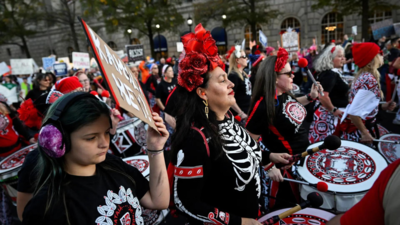
A radical feminist movement from South Korea has found traction across the globe, particularly in the United States after Donald Trump’s victory in the Presidential elections.
Known as the “4B” movement, short for the “Four Nos” — no dating, no sex, no marriage, and no childbearing with men — this campaign emerged in the mid-2010s as a response to deeply rooted gender inequities in South Korea. Recently, it has become a viral phenomenon as American women grapple with concerns about rights and gender equality.
What is the 4B movement?
The 4B movement, initiated by South Korean women, seeks to resist traditional gender roles and the heavy burden placed on women to perform both paid work and the majority of household duties.
Official data indicates South Korean women do 3.5 times more unpaid work at home than men, which, combined with widespread cyber-sex crimes and high-profile cases of gender-based violence, has driven many women to reject conventional relationships altogether.
Baek Ga-eul, 33, described the movement to AFP as a response to “a male culture that pretends to be proper toward women while, behind closed doors, shares sex videos of their girlfriends with their male friends.”
The movement goes viral in the US
After Trump’s November election victory, the 4B movement became one of the top search trends on Google in the United States, with TikTok and Facebook videos on the topic quickly gaining popularity.
The election, marked by concerns over Trump’s three conservative Supreme Court appointments and the resulting rollback of abortion rights, served as a flashpoint for many American women questioning their societal roles and gender equality.
What has been the impact on South Korea
South Korea has one of the lowest birth rates in the world, and nearly 42% of households consist of single occupants, a trend expected to continue. In Seoul, over 40% of young adults reported they had not had sex in the past year, with a lack of interest cited by women as the primary reason. For many, even if they don’t explicitly identify with 4B, their choices reflect similar values of independence and non-engagement in traditional relationships.








![Best Weight Loss Supplements [2022-23] New Reports!](https://technologytangle.com/wp-content/uploads/2022/12/p1-1170962-1670840878.png)




